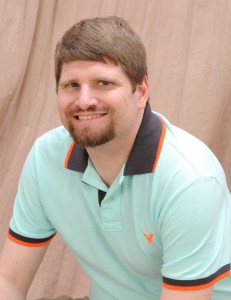Due to autism with its speech delays, sensory processing issues, and deficit in ability to decode social norms—life was not always easy—especially with regards to gainful employment.
By Ron Sandison
As I reflect upon this past year and all the blessings in my life; March 20, having my first child, Makayla Marie; April 5, Charisma House publishing my first book A Parent’s Guide to Autism: Practical Advice. Biblical Wisdom; December 7, four years of marriage, and speaking at over 50 autism events for the year. Due to autism with its speech delays, sensory processing issues, and deficit in ability to decode social norms—life was not always easy—especially with regards to gainful employment.
As we enter 2017, New Year, I reached another milestone over 8 ½ years of full-time employment in the mental health field at Havenwyck Hospital and 14 years (part-time) as a professor of theology at Destiny School of Ministry. Less than 5% of individuals with autism are gainfully employed. Previously to 2008 my employment history could be summed up by actor, Denzel Washington, “Do what you have to do, to do what you want to do.”
After I graduated from Oral Roberts University with a Master of Divinity (2002), I was employed four years as an intern for youth ministry. When metro Detroit experienced harsh economic conditions due to the automotive industry I found myself unemployed. For the next two years I struggled for steady employment and sank into a finical sinkhole, unable to pay my bills, I was forced to live with my parents.
Autism’s intensified my burden of underemployment causing anxiety and depression. My dad would yell, “You have a master degree, why are you working only part-time at Corky’s Skate Shop making $5.50?”
In 2008, my luck changed, while working part-time for Comfort Keepers I overheard Natalie, a staff at the nursing home, tell a family member of a residence, “I work at Havenwyck Hospital.” I told Natalie, “I submitted my résumé to Havenwyck four months ago and never heard back!” She advised me, “Tomorrow go and ask for my supervisor Torrie and he will hire you. I’ll call him tonight.” The next day, I went to the hospital and asked to meet with Torrie — he hired me.
Four ways employment in the mental health field has been a good fit for living the dream and utilizing my gifts:
1. Adapting to change in schedule.
Autism causes me to hate change; I love routines. Employment in the mental health field has forced me to learn methods of dealing with change. The only consistent in the mental health field is change—high turner over ratios in both patients and staff. Every day the hospital receives new patients and those patients can present new challenges. During a topical year I work with between 300-400 different patients. Adapting to change has prepared me for being a dad; I learned quickly an infant will destroy any established autistic routines.
2. Coping with Depression.
Renowned Asperger’s/autism clinical psychologist, Tony Attwood, stated, “In England and Australia about 30-40% of mental health patients treated for depression and anxiety are on the autism spectrum.” Autism has caused me to experience severe blots of depression and anxiety. During my freshman, sophomore, and part of my junior year of high school due to depression from self-esteem issues I struggled with substance abuse of alcohol and drugs. Running, memorizing Scriptures, comedy movies and a spinning ring have helped me to cope with depression and stress. When I lead groups I am able to share with patients coping skills for dealing with depression and anxiety.
3. Confidence speaking to groups.
I received speech therapy from age two until sixteen. At times I still mispronounce words with the letters “TH” and “L” sounds. My speech impediment mixed with a monotone Transformer’s voice caused me to be self-conscience. Leading groups 5 days a week for 8 ½ years helped me gain self-confidence and enabled me to express myself. This has equipped me for my speaking engagements for my book tour.
4. Helping others be the best they can be
Overcoming my autism quirks and developing social skills has given me a desire to empower others to recover from their life’s challenges. During the last two weeks I had the privilege to encourage three young men dealing with depression and anxiety from Asperger’s. I was able to share with them my journey with autism and coping skills I use for life’s stressors.
I am living the dream. Enjoying working in the mental health field helping and encouraging others on his or her journey to wholeness.
***

Ron Sandison works full time in the medical field and is a professor of theology at Destiny School of Ministry. He is an advisory board member of Autism Society Faith Initiative of Autism Society of America. Sandison has a Master of Divinity from Oral Roberts University and is the author of A Parent’s Guide to Autism: Practical Advice. Biblical Wisdom published by Charisma House. He has memorized over 10,000 Scriptures including 22 complete books of the New Testament and over 5,000 quotes.
He frequently guest speaks at colleges, conferences, autism centers, and churches. Ron and his wife, Kristen, reside in Rochester Hills, MI, with a baby daughter, Makayla Marie born on March 20, 2016.

You can contact Ron at his website www.spectruminclusion.com or email him at sandison456@hotmail.com.
Other blogs by Ron Sandison:
Tony Atwood gave me Insight into my Anxiety and Depression
How Telemarketing empowered me to be a better Advocate
Five Ways Autism Makes Me Unique
Five Things That I Fear as A Person with Autism
Five Ways Autism Makes me a Cool Dad








